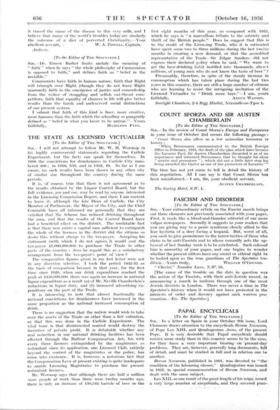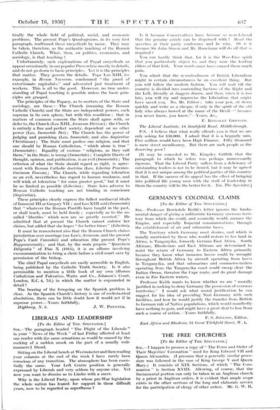PAPAL ENCYCLICALS
, [To the Editor of THE SPECTATOR.] SIR,—In a letter on Spain in your October 9th issue, Lord Clonmore draws attention to the encyclicals Rerum Novarunt; of Pope Leo XIII, and Quadragesimo Anno,- of the present Pope. It is very desirable that Papal encyclicals should receive more study than inthis country seems to be the case,. for `they-have a very' important bearing -On 'present:day problems. They are, however, generally long dociunents, full- of detail, and must be studied in full and in relation one to
another. •
Return Navarunt, published in 1891, was devoted to "the condition of thelabouring classes." Quadragesimo was issued, in 1931., in special commemoration of Rerum Novarum, and dealt with the-same-subject.
- Leo XIII, es.one result of the great length of his reign, issued a very large. number .al eneyeliOalso.and. they . covered prae-,
tically the whole field of . political, social, and economic problems. The present Pope's Quadragesimo, in its very first paragraph, reaffirmed those encyclicals by name. They may be taken, therefore, as the •authentic teaching of the Roman Catholic Church. What, then, on politics, economics, and sociology, is that teaching ? •
Unfortunately, such explanations of Papal encyclicals as appear occasionally in our popular Press relate most ly.to details, and do not go down to basic principles. Yet it is the principles that matter. They govern the details. Pope Leo XIII, for example, in Rerum Novarum, condemned "the greed of extortionate capitalists," and advocated just treatment of workers. This is all to the good. However, no true under- standing of Papal .teaching is possible unless the basic prin- ciples are grasped.
The principles of the papacy, as to matters of the State and sociology, are these :—The Church (meaning the Roman Catholic Church) and the State are independent powers, each supreme in its own sphere,-but with this condition: that in matters of common concern -the State shall agree with, or defer to, the Church (Leo XIII, Arcanum Divinae); the Church is entirely a free and perfect society, dependent on no other power (Leo, Immortale Del); The Church has the power of judging and punishing (Leo; Immortale, and also Sapientlae Christianae) ; The State must profess one religion, and that one should be Roman Catholicism, "which alone is true" (Immortale); Equality of various "religions, as they call them," in the State, is wrong (Immortale); Complete liberty of thought, opinion, and publication, is an evil (ImnwrIale); The criterion of what the State should regard as right, is agree- ment with Roman Catholic doctrine (Leo, Libertas Praestan, Iissimum Don urn); The Church, while regarding toleration as an evil, nevertheless has regard to human. weakness, and will wink at toleration "for some greater good," but it must be as limited as possible (Libertas) ; State laws adverse to Roman Catholic teaching are not binding in conscience (Sapientiae).
These principles clearly express the fullest mediaeval ideals of Innocent '11F Gregory VII; and Leo XIII said (Immortale) that "whatever the Roman Pontiffs have taught in the past, or shall teach, must be held firmly ; especially as to the so- called ' liberties ' which now are so greatly coveted." He admitted that at present the Church cannot enforce her claims, but added that she hopes "for better times (Libertas).
• It must be remembered also that the Roman Church claims jurisdiction over marriage (see Leo's Arcanum, and the present Pope's Cash i Connubii) and education (the present Pope's Rappresentanti) ; and that, by the motu proprio " Quantavis Diligentia" of Pius X (1911), it is an offence involving excommunication to bring a cleric before a civil court save by permission of the bishop.
The chief Papal encyclicals are easily accessible in English, being published by the Catholic Truth Society. Is it also permissible to mention a little book of my own (Roman Catholicism and Toleration, Watts and Co., Johnson's Court, London, E,C. 4, 7d.) in which the matter is expounded in detail ?
The bearing of the foregoing on the Spanish problem is clear. As the Spanish Church's history is one of ecclesiastical absolutism, there can be little doubt how it would act if in supreme power.—Yours faithfully,





















































 Previous page
Previous page